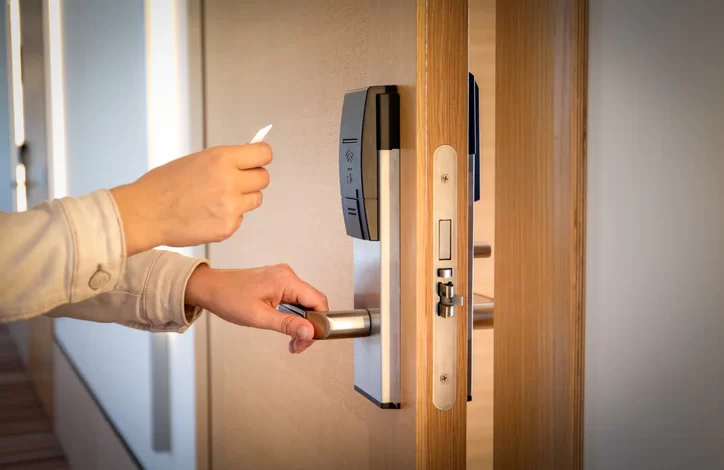
The Rise of RFID Hotel Key Card Sustainable Options in Hotels
In recent years, there has been a growing trend in the hospitality industry towards implementing sustainable practices. As travelers become more environmentally conscious, hotels are under pressure to reduce their carbon footprint and adopt eco-friendly initiatives. One such initiative that is gaining popularity among hotels around the world is the use of RFID key cards.
RFID (Radio Frequency Identification) technology involves using radio waves to transfer data between an electronic tag or label and a reader. These tags can be attached to various objects, including hotel key card. By incorporating this technology into their operations, hotels can not only enhance security but also significantly reduce their environmental impact.
How do RFID Key Cards Work?
Traditionally, hotel room keys were made from plastic or metal materials that had to be manually inserted into a lock for access. However, with RFID key cards, guests simply have to hold the card near the door sensor for it to unlock automatically. This process eliminates the need for physical contact with the door handle, reducing wear and tear and saving energy by keeping air-conditioned air inside the room.
Additionally, each RFID key card contains a unique code that is read by the sensor on the door lock. This code is encrypted and cannot be duplicated easily, making it much more secure than traditional keys that can be easily copied.
What is RFID Technology?
RFID (Radio Frequency Identification) technology is a type of wireless communication that uses radio waves to transfer data between devices. It has gained popularity in recent years as an eco-friendly and sustainable option for key cards in hotels.
The basic components of RFID technology include a tag, which is attached to the object being tracked or identified, and a reader, which sends out radio waves and receives signals back from the tag. The tag contains a microchip that stores information and an antenna that transmits the data back to the reader.
One of the key benefits of using RFID technology for key cards in hotels is its contactless nature. Unlike traditional magnetic stripe cards that require physical contact with a card reader, RFID key cards can be read when placed near the reader, making it faster and more convenient for hotel guests.
Additionally, RFID technology offers better security compared to traditional keys. Each RFID key card has a unique identification number that cannot be duplicated or easily hacked, reducing the risk of unauthorized access to hotel rooms. This also eliminates the need for costly lock replacements if a guest loses their key card.
Aside from convenience and security, RFID technology also contributes to sustainability efforts in hotels. With traditional keys made of plastic or metal materials, they often end up in landfills after use. In contrast, most RFID key cards are made with recyclable materials such as paper or biodegradable plastics, reducing waste and promoting environmental conservation.
Benefits of RFID Key Card Sustainable Options for Hotels
RFID key cards have become a popular and sustainable option for hotels looking to reduce their environmental impact. This technology uses radio frequency identification (RFID) to access rooms, replacing traditional keycards or metal keys. In this section, we will explore the various benefits of RFID key card sustainable options for hotels.
1. Reduced Plastic Waste: One of the most significant advantages of using RFID key cards is the reduction of plastic waste. Traditional magnetic stripe key cards are made from PVC plastic, which is non-biodegradable and adds to the growing problem of plastic pollution. On the other hand, RFID key cards are made from recyclable materials and can be reused multiple times before needing to be replaced.
2. Energy Efficiency: Another advantage of RFID key card technology is its energy efficiency. Unlike traditional keys that need to be inserted into a lock and turned, RFID key cards only require proximity to a reader for access. This eliminates the need for electronic locks that consume electricity continuously, resulting in significant energy savings for hotels.
3. Cost Savings: The use of RFID key cards can also lead to cost savings for hotels in several ways. Firstly, as mentioned earlier, they are more durable than traditional keys and do not need frequent replacement, reducing operational costs for hotels. Secondly, with energy-efficient locks and reduced maintenance costs associated with them, hotels can save on their utility bills as well.
Environmental Impact and Sustainability
The use of RFID key card technology in hotel key card not only offers convenience and security, but it also has a positive impact on the environment. Traditional plastic key cards have been a standard in the hotel industry for many years, but they contribute to significant waste and pollution. With the rise of sustainable options like RFID key cards, hotels can now reduce their environmental footprint while still providing excellent service to their guests.
Reducing Plastic Waste:
Plastic pollution is a growing global concern, with an estimated 8 million tons of plastic being dumped into the oceans every year. In the hotel industry alone, millions of plastic key cards are discarded each day, leading to immense amounts of waste that end up in landfills or polluting our waterways. RFID key cards are made from durable materials that can be reused multiple times, significantly reducing the amount of plastic waste generated by hotels.
Energy Efficiency:
Another environmental benefit of using RFID key card technology is its energy efficiency. Traditional electronic keys require constant power supply to operate, which can lead to high energy consumption and increased carbon emissions. In contrast, RFID technology uses low-frequency radio waves to transmit information between the card and reader, requiring minimal power usage. This not only reduces energy consumption but also lowers utility costs for hotels.
Case Studies: Successful Implementation in Hotels
Many hotels around the world have already implemented RFID key card sustainable options and have seen impressive results. Here are a few case studies that showcase the successful implementation of this technology in hotels.
Marriott International
Marriott International, one of the largest hotel chains in the world, has been at the forefront of implementing sustainable practices. In 2010, they launched their “Green Hotels Global” program with a goal to reduce their environmental impact by 25% by 2025. As part of this initiative, Marriott introduced RFID key cards in all their properties.
The implementation of RFID key cards had an immediate impact on energy consumption and operational efficiency. With traditional magnetic stripe keys, guests often leave them inserted in the slot when leaving the room, resulting in unnecessary electricity usage for air conditioning and lighting. With RFID key cards, once removed from the slot, all power is turned off automatically. This simple change has resulted in significant energy savings for Marriott hotels worldwide.
The Alila Ubud Hotel – Bali
Located amidst lush tropical forests and rice paddies in Bali, The Alila Ubud Hotel is renowned for its commitment to sustainability and eco-friendly practices. In 2016, they decided to switch to RFID key cards as an alternative to plastic key cards which were being discarded after every guest stay.
Challenges and Limitations of RFID Key Cards in Hotels
RFID (Radio Frequency Identification) technology has become increasingly popular in the hospitality industry, especially in hotels. These electronic key cards use radio waves to transmit data and allow guests access to their rooms. While they offer numerous benefits such as convenience and security, there are also challenges and limitations that come with using RFID key cards in hotels.
Initial Cost: One of the main challenges of implementing RFID key card systems in hotels is the initial cost. The technology itself can be quite expensive, and it requires an investment in specialized equipment such as readers and software. This can be a significant barrier for smaller or independent hotels looking to adopt this green solution.
Integration with Existing Systems: Another limitation is the integration of RFID key card systems with existing hotel management systems. Many older properties may not have the necessary infrastructure or technology in place, which can make it challenging to implement these new systems seamlessly.
Maintenance and Replacement Costs: While traditional magnetic strip key cards need to be replaced less frequently, RFID cards require regular maintenance and replacement due to wear and tear from frequent use. This can add up over time, making it a costly option for some hotels.
Security Concerns: Although RFID key cards are generally considered more secure than traditional keys, they are not entirely immune to hacking or cloning attempts. Hackers can intercept signals between the card reader and door lock, potentially gaining access to guest rooms without authorization.







